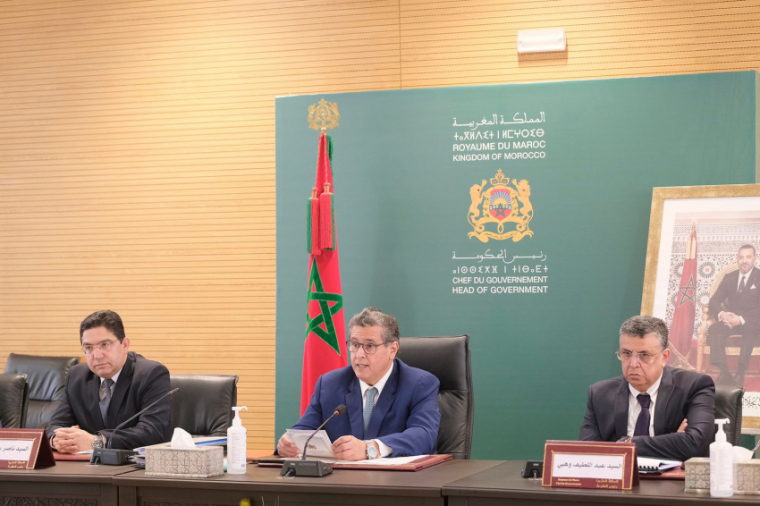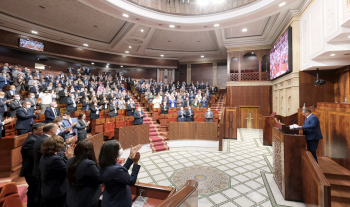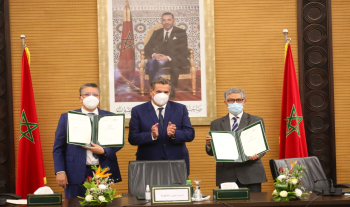Speech of the Head of Government, Mr. Aziz Akhannouch, on the occasion of the convening of the National Commission for Sustainable Development in its third edition

In the name of Allah, the Most Gracious, the Most Merciful, praise be to Allah and peace and blessings be upon the most honorable of the Messengers.
Ladies and Gentlemen Ministers,
Mr. High Commissioner for Planning,
Mr. President and Director General of the Moroccan Agency for Sustainable Energy,
Mr. Director General of the Moroccan Agency for Energy Efficiency,
Madam the President of the Association of Heads of Regions of Morocco,
Mr. President of the General Confederation of Moroccan Enterprises (CGEM),
Mr. President of the Professional Group of Moroccan Banks,
Ladies and Gentlemen,
1. General context and frame of reference
I am pleased to chair today the work of the meeting of the National Committee for Sustainable Development, which is being held in the atmosphere of the holy month of Ramadan, and we ask God Almighty to make them days of goodness, Yemen, and blessings for all, and to lift the epidemic from us and to protect our country and humanity as a whole from all evil.
This meeting is being held in accordance with the provisions of Decree 2.19.452, which established a new framework for the governance of development in our country, with the aim of monitoring the implementation of the contents of the National Strategy for Sustainable Development, as well as the implementation of the UN Agenda 2030 and improving the convergence of public strategies and policies in this field.
It is no secret that our country, under the wise leadership of His Majesty King Mohammed VI, may God protect him, has engaged in a proactive and voluntary policy aimed at achieving sustainable development goals, fulfilling international commitments, and completing the relevant development projects.
This is evident in many stations, as the Kingdom's Constitution of 2011 enshrined the right of all citizens to sustainable development and living in a healthy environment, and in 2014, Framework Law No. 99.12 was issued as a national charter for the environment and sustainable development, which stipulated the need to prepare a national strategy for sustainable development, which was adopted by the Ministerial Council held on June 25, 2017, with the aim of raising the stakes of strengthening development governance and achieving a gradual transition towards a green economy. Morocco also committed, along with the entire international community, in 2015 to implement the United Nations 2030 Agenda.
Perhaps our meeting today in this exceptional circumstance in which we are working to raise the challenges of getting out of the Corona pandemic and reducing its negative effects, as well as facing the repercussions of the Russian-Ukrainian crisis on the global economy as a whole, and the economy of our country in particular, is an occasion to identify the constraints and achievements related to sustainable development, which is today one of the pillars of the new development model, which the government program has committed to activating in all its axes and objectives by keeping pace with the transformation of the national economy, the consecration of the social state and the development of human capital.
Ladies and Gentlemen,
Our meeting will be devoted to examining the annual national report of the High Commission for Planning in the implementation of the requirements of Article 9 of the aforementioned decree, as well as the results of the evaluation of the National Strategy for Sustainable Development and the roadmap for its review in accordance with the decision issued by this Committee during its last meeting.
2- The national report of the High Commission for Planning entitled:
Morocco's Sustainable Development Goals in the Context of the COVID-19 Pandemic.
Thanks to the wise and visionary policy of His Majesty King Mohammed VI, may God assist him, Morocco was one of the fastest countries to respond to reducing the economic and social effects of this pandemic, as it resorted early to a set of qualitative and unprecedented measures, such as the adoption of distinguished governance to manage this stage, manifested in the creation of specialized committees, and also initiated the creation of the Special Fund for the Management of the Coronavirus (Covid-19) pandemic, which was allocated to bear exceptional expenses in the health field, support contracting activities and provide assistance. Direct financial for the most vulnerable. In the same context, a legal framework for the state of health emergency has been put in place, ensuring adherence to the principle of legality and strict compliance with the provisions of the Constitution and international conventions, especially those relating to human rights and fundamental freedoms.
These measures have had positive results, for example, to reduce the deepening level of poverty and vulnerability. The poverty rate increased from 1.7 percent in 2019 to 2.5 percent during the lockdown in 2020, and the vulnerability rate from 7.3 percent to 8.9 percent. The poverty rate would have reached 11.7 percent and the vulnerability rate to 16.7 percent in the absence of these measures.
Overall, despite these exceptional circumstances, our country has been able to achieve several goals in accordance with the UN Agenda 2030, especially those related to human capital, and is moving steadily towards achieving goals related to physical capital, as well as those related to combating the effects of climate change. There is no doubt that the programs and strategies adopted in these areas will accelerate the pace of achievements on the path to achieving the desired goals.
3- Evaluation of the National Strategy for Sustainable Development
Ladies and Gentlemen,
The National Strategy for Sustainable Development has constituted a qualitative leap and a voluntary and ambitious policy with the aim of accelerating the transition to a green and inclusive economy by 2030 by adopting 7 major bets distributed around 31 strategic axes and 137 goals. Since its adoption in 2017, the tracking of its implementation has shown an overall completion rate of 58 percent by the end of May 2021 (72 percent for sectoral plans and 44 percent for the Methylism of Management Charter), which falls short of the ambition we aspire to. mechanism.
In order to increase the efficiency of the performance of the national strategy for sustainable development and its compatibility with national and international developments, the Ministry of Energy Transition and Sustainable Development conducted an evaluation study to discuss ways to update this strategy, as this study monitored the obstacles that prevent the achievement of the desired goals, represented in the adoption of two different references by our country: the first is international and is represented in the international agenda, and the second is national related to the national strategy for sustainable development, and that both adopt different goals and mechanisms, which results in blurring in setting national goals. for sustainable development.
The study showed that more than 600 measures adopted in this strategy are derived from the sectoral programs for the year 2020, which have become outdated today, and that they did not consider the territorial and regional dimensions in a way that considers the specificity of each region and ensures their balanced implementation. Also, a large number of its objectives do not have indicators and reference values, making it difficult to track the stages of implementation.
4- Future prospects and directions
Ladies and Gentlemen,
The magnitude of the challenges that await our country in implementing the UN agenda in these years that separate us from 2030 requires more coordination, precaution, convergence, and effectiveness in sectoral programs, projects, and policies while rearranging priorities in view of the repercussions of the Corona pandemic and the exceptional circumstance that the world is going through. Therefore, I call on you to launch a new dynamic in terms of updating the strategy to fit the development goals set out in the UN agenda.
I also remind you of the importance of the regional and territorial dimensions in the National Strategy for Sustainable Development, in the application of the principle of territoriality referred to in Framework Law 99-12 on the National Charter for the Environment and Sustainable Development, which would contribute to raising the challenge of reducing social and territorial disparities.
Peace, mercy, and blessings be upon you.







